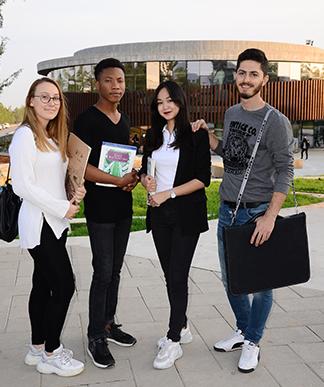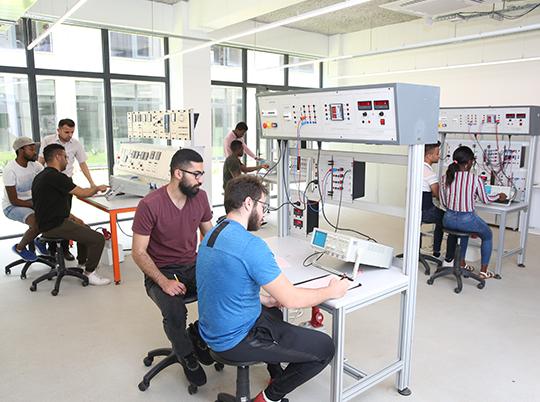Electronics and Communication Engineering (MSc)



About the Program
The aim of the Electronics and Communications Engineering Master Program is to have candidates gain competency in scientific and technical knowledge on the design, development, production, and operation of electronic and communication layouts and systems.
Education Opportunities
Electronics and Communications Engineering Master Program consists of seven courses, seminar and thesis. While providing students with competence in the fields of the electromagnetics, wave theories and applications, processing, transmitting and perception of information such as audio and video, it also provides outstanding opportunities in developing research skills and educates expert engineers with its laboratory facilities available.

Career Areas
Our graduates are employed as senior researchers in a wide range of sectors, especially in electronics, communications, telecommunications, defense industry, research, and education institutions. Graduates can also pursue an academic career by enrolling in a related doctorate program.
Contact
Institute of Graduate Studies and Research
Graduate Sciences and Education Center, GE106
Tel: +90 392 671 1111 Extension: 2776
Institute E-mail: ciu-institute@ciu.edu.tr
Compulsory Courses
First Semester
NUMERICAL LINEAR ALGEBRA
Course code
EELE501Credit
3Theoretical
3Practical
0Ects
0CIRCUITS AND SYSTEMS ANALYSIS
Course code
EELE502Credit
3Theoretical
3Practical
0Ects
0ELECTIVE I
Course code
EELE5X1Credit
3Theoretical
3Practical
0Ects
ELECTIVE II
Course code
EELE5X2Credit
3Theoretical
3Practical
0Ects
ELECTIVE III
Course code
EELE5X3Credit
3Theoretical
3Practical
0Ects
ELECTIVE IV
Course code
EELE5X4Credit
3Theoretical
3Practical
0Ects
ELECTIVE V
Course code
EELE5X5Credit
3Theoretical
3Practical
0Ects
Second Semester
THESIS
Course code
EELE500Credit
0Theoretical
0Practical
0Ects
0SEMINAR
Course code
EELE590Credit
0Theoretical
0Practical
0Ects
0Elective Courses
Students who are interested in pursuing advanced graduate studies leading to a master’s, doctoral degree, or professional doctorate degree for the Fall and Spring semesters every year. Applicants can directly apply online to our graduate programs using the application portal.
International Applicants- Required documents:
- Bachelor’s Degree Diploma
- Bachelor’s Degree transcripts for each completed academic term/year.
- Evidence of English Language competence: TOEFL (65 IBT) or IELTS (5.5). Students without these documents will take the CIU English proficiency exam on campus following arrival.
- Scanned copy of international passport/birth certificate
- CV
- Fully completed and signed CIU Rules and Regulations document (which can be downloaded during the online application)
Click for detailed admission requirements information.
Cyprus International University provides academic scholarships for its students as an incentive for success, with most students benefiting from 50%, 75% or 100% scholarships or discounted tuition fees. Click for more information.
| Fee per course | € 350,00 |
| Fee for thesis | € 1.050,00 |
| Fee for seminar | € 120,00 |
| Scientific Foundation per course | € 150,00 |
| Annual Registration Fee | € 295,00 |
| VAT Exc. |